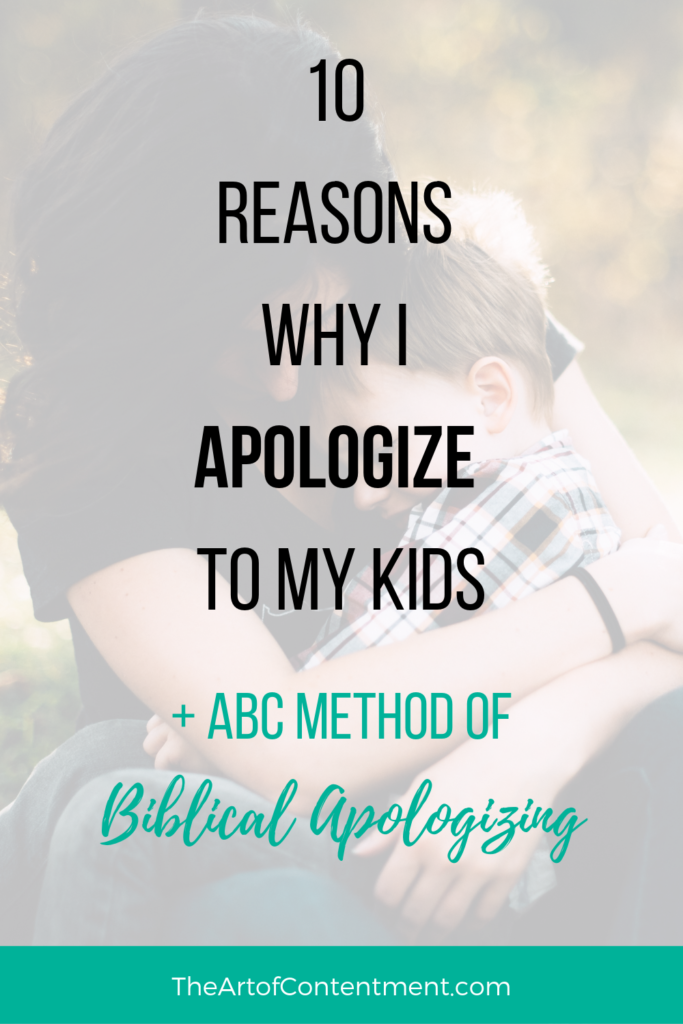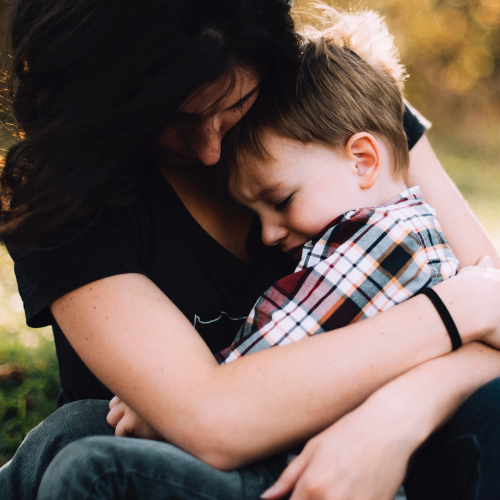It happened in an instant.

Even with his lips pressed together, he looked like he was licking taffy off the roof of his mouth. But his crinkled eyebrows and wet eyes told a different story.
Some people think autistic kids don’t have normal feelings, but I knew better.
Because I had just made my son cry.
And not cry in a defiant you-caught-me-doing-something-wrong-and-I-don’t-like-it way. No, this was a breach in the foundation of trust between a mother and her child.
He sought my attention in a childish, silly way and I had lashed out at him. He shied away. The rift had opened.
This was more than an “oops” moment. I hadn’t stepped on his foot or accidentally knocked over his iPad.
I had hurt his heart and our relationship.
As moms, how should we handle moments like this? Because moments like this will happen.
We roll that sticky newborn’s head onto our chest and look at those puffy eyes and curled fingers and think “I’ll love you forever. Forever and ever. I’ll never let anyone hurt you.”
Finding out only too soon that some of those hurts will come from our own hands.
Our vision of perfect mom life gets a cold splash of reality when our bleary eyes open to comfort a colicky infant. Again. Our weary bodies lurch out of bed to meet needs that never seem to end.
The picture of selflessness we paint for motherhood collides with our sinful human hearts and our frail human bodies.
What do we do as moms when we’ve wronged our kids? Maybe you grew up in a home where mom and dad didn’t believe in apologizing to a child.
Presuming that apologizing would erode their parental authority, they let the moment blow over. One long-term consequence is when the child grows up, she may have trouble making decisions.
Say what? That’s right. Maybe she had a suspicion that what mommy said or daddy did was wrong, but no confirmation came. No apology. Now she’s confused. She doesn’t trust her own judgment. What’s right? Is this wrong? It’s nebulous, a gray area.
And all too often, the child grows up to be a mom who models the same confusing interactions with her own son or daughter.
But we can be chain breakers.
We can leave our kids a legacy of godly repentance as we lead by example.
Let’s call apologizing by its biblical name: repentance. When we approach asking forgiveness, our responsibility is to confess, repent and restore, and your child’s role is to forgive.
As parents, when we repent we accomplish three things: we restore the relationship between ourselves and our child; we restore the relationship between ourselves and God; and we teach our children how to repent and forgive as we model this in our lives.
Remember, most lessons are caught, not taught.
If we want our children to develop tender hearts that are quick to repent and eager to forgive, we must live it. You live it, they’ll believe it.
Repentance works powerfully in our lives. Surprising benefits bloom from a heart that turns away from sin. Let me share 10 reasons why I apologize to my kids:
- 1. Repentance realigns our hearts with God. Sins against our fellow people are ultimately sins against God, so repentance begins with God.
When we repent, we agree with God. Whatever sin had us turned away from God, repentance turns us back toward him.
In the same way, apologizing sincerely to our wounded child realigns our hearts with one we’ve hurt. We agree this relationship is worth nurturing. We are on the same path to healing.
- 2. We become teachable. When our hearts are realigned with God, we become teachable, useful, moldable. “Oops” moments are opportunities to grow if we take advantage of it.
Jesus called repentant prostitutes and tax collectors His friends, but didn’t have much to say to the religious leaders who thought they were so righteous. Without repentance, the Pharisees, Sadducees and scribes couldn’t accept Jesus’s teaching.
As we model repentance to our children, we can train them to have teachable hearts, too.
- 3. Apologizing builds trust. Our kids can trust us to right our wrongs, to seek out our child’s heart, to pursue their forgiveness. We become predictable – in a good way.
That kind of dependency generates security that makes our kids feel safe.
- 4. Apologizing puts a cap on sorrow. In 2 Corinthians, Paul is writing again to the church in Corinth after rebuking them in 1 Corinthians. He’s gratified and relieved to find that his rebuke led them to repent in godliness rather than wallow in grief. He writes:
Now I rejoice, not that you were made sorry, but that your sorrow led to repentance. For you were made sorry in a godly manner, that you might suffer loss from us in nothing. 2 Corinthians 7:9 NKJV
Be sorry in a godly way – not that you mope around beating yourself up, but you repent, ask forgiveness, and heal together. That’s God’s way.
- 5. Repentance honors the Lord. Repentance is so important that it’s a precursor to faith. “Repent and believe” in that order. Jesus declared:
“The time is fulfilled, and the kingdom of God is at hand. Repent, and believe in the gospel.” Mark 1:15
As we discussed in the first point, repentance realigns our hearts with God.
We cannot have faith before we agree with God that He is right. Apologizing is an act of obedience, and obedience always honors God.
- 6. Repentance cancels the debt. When we sin against our child, we’ve shifted the relationship to a debtor/lender status.
Unrepentant sin is like a bad debt. It causes tension and pain for both parties.
But repentance on our side and forgiveness on our child’s side cancels the debt. The relationship is balanced, and healing begins.
Paul writes to the church in Colossae that Jesus took the “handwriting of requirements” – our debt collection judgment – and nailed it to the cross. Paid. We are debt free with God in Jesus’s name and we are debt free with our child.
- 7. Repentance shows love. Jesus died so we could be forgiven. Is there anything more loving? Apologizing to our kids is an act of love because forgiveness came at such a high price.
- 8. Makes our hearts sensitive by practice. Habits are hard to make but easy to maintain. Saying “sorry” can be hard, right?
We fight our pride, our frustration with our weakness. Repentance is humbling. But the thing is, the more we practice, the easier it becomes. Maybe next time we’re about to lash out, our spirit will catch us.
That still-small-voice will become ever more sensitive as we practice listening to it and obeying it.
- 9. Brings joy to God. Do you ever wonder how much it wounds God to see us hurt each other? And doesn’t it make us feel good when our kids forgive their siblings and friends and hug it out? I think our Father treasures those sweet moments, too.
- 10. Respects the personhood of our child. Have you ever noticed that many adults are quick to apologize to other adults, but oh so reluctant to apologize to a child?
Apologizing acknowledges the person of our child. His value is as great to God as ours, his heart as precious, his soul as rare.
We recognize that our child is an eternal spirit with a temporary body – just like you and me. Respect his personhood by apologizing to him just like we would ask forgiveness from anyone else.
Apologizing to our kids is an act of love, holiness, and obedience. Now let’s look at the biblical (in my opinion) method of apologizing. I called it the ABC method of repentance.
A – Apologize sincerely.
Here’s how not to apologize: “I’m sorry you were hurt.” You’ve heard someone say this before, right? This is really sorrow over getting caught and feeling pressure to apologize. And notice that there was no request for forgiveness. We recognize the lack of sincerity and we’re still miffed. Rightly so.
“I’m sorry for _________, will you please forgive me?” This proper apology spells out the specific wrong and then asks for forgiveness. This last part is important: after asking for forgiveness, you are kicking the can to the other person. Now it’s their turn to respond and complete the circle of forgiveness.
B – Bear fruits worthy of repentance.
Jesus said:
“Therefore bear fruits worthy of repentance…” Matthew 3:8
True repentance is accompanied by change. When we first accepted Christ, our lives began to change. Others noticed a difference in our behavior and attitude. We were different.
Fruits of repentance are the proof of our changed hearts. Our child should see a difference in us.
C – Continue healing the relationship through acts of restoration.
When Zaccheus, the tax collector, believed in Jesus, he repaid fourfold what he’d stolen. Likewise, the laws of the Old Testament spell out how a person should repay the victim for anything from stealing an animal to accidentally physically injuring someone.
And researchers say that it takes about five positive interactions to overcome one negative interaction.
Image
Restore. After we apologize to our kids, find one or two ways to love on your child. Extra cuddles, a special book, singing a favorite song, a dance party. However, I don’t recommend buying gifts for your child. Remember, kids are sinners, too, and they may quickly take advantage!
I reached out and pulled my son’s small body onto my lap. His muscles were rigid with resistance. I kissed his forehead.
“I’m so sorry, Luke. I’m so sorry. Please forgive me. Mommy loves you so much.” He was silent, as nearly-nonverbal autistic kids can be, but a few minutes later he was jumping off the couch and running fiery circles around the room.
Back to business as usual. Just as it should be.
